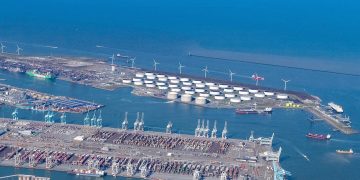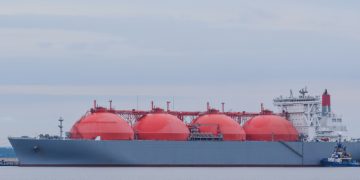In recent times, the UK Club has observed an uptick in cases where LNG ships have faced operational delays due to presence of LNG heavies.
As explained, “LNG heavies” are long chain hydrocarbons, which can create operational problems during shipping and handling. LNG is mostly made up of methane, but also includes small amounts of other hydrocarbons like ethane, propane, and butane, along with traces of nitrogen.
The problem arises when heavier hydrocarbons (called “C6+”) are present in higher amounts. Unlike methane, these compounds can solidify at the ultra-cold storage temperatures used for LNG (around -162°C), causing freezing and clogging in ship equipment like pipelines, pumps, or strainers.
Different production regions yield LNG with slightly different compositions and even a seemingly tiny 0.04 mol% (or 400 ppm) concentration of heavies in a 100,000-tonne cargo equals about 40 tonnes heavies in the cargo and this can cause an operational havoc.
Troubleshooting and advanced testing
When addressing operational issues such as filter clogging or increased back pressure, it is essential to inspect the internal components of the vessel’s machinery to identify potential sources of moisture ingress or other forms of contamination. Once the possibility of moisture ingress is ruled out, it is advised to collect cargo and strainer residue samples for extended testing using GPA 2286—a specialized procedure that can detect even tiny concentrations of heavy hydrocarbons (less than 0.01 mol%). In the attached report, Brookes Bell highlights details regarding the sampling and suggested testing procedure.
Commercial impacts and legal safeguards
The presence of LNG heavies can lead to delays, increased costs, and legal disputes between shipowners and charterers. Damage caused to ship’s machinery and equipment can also be very costly, not only in terms of repair costs, but also the loss of time. There are a number of practical steps which can be taken to try to minimise the problems that can arise, including the introduction of bespoke clauses in contracts that clearly define the responsibilities of both shipowners and charterers. These clauses can address how to handle, treat, or offload heavy hydrocarbon to avoid operational and legal complications.
Mitigation measures
According toBrookes Bell, to mitigate potential operational issues arising from this, strategic heel management procedures are implemented. These procedures include:
- Precise calculations of the heel quantity to be retained, especially for vessels with Dual Fuel Engines
- Careful distribution of heel across the cargo tanks, ensuring it remains below sloshing limits
- Continuous monitoring of tank temperatures and pressures, with Average Tank Temperature (ATR) maintained around -125°C during the voyage
- Diligent planning for cargo tank conditioning prior to arrival at loading ports, aiming for an ATR below -155°C
When addressing operational issues such as filter clogging or increased back pressure, it is essential to inspect the internal components of the vessel’s machinery to identify potential sources of moisture ingress or other forms of contamination. Key areas to examine include:
- Inert Gas Generator – Verify the dew point and calibrate if necessary
- Nitrogen Generator – Verify the dew point and calibrate if necessary
- LNG Vaporiser – Check for internal leaks
- BOG Compressor cooling water system – Check for internal leaks
- Cargo and condensate lines purging after maintenance – Review purging requirements and procedure
- Increasing the filter mesh size may be considered in consultation with equipment manufacturers and Charterers, but it is not the preferred option
In the event of heavy hydrocarbon related delay or operational issues arising, the early involvement of the P&I and Defence Club is crucial to navigate successfully both legal and technical complexities and minimise the risk of disputes which may relate to them, the Club concludes.



























































